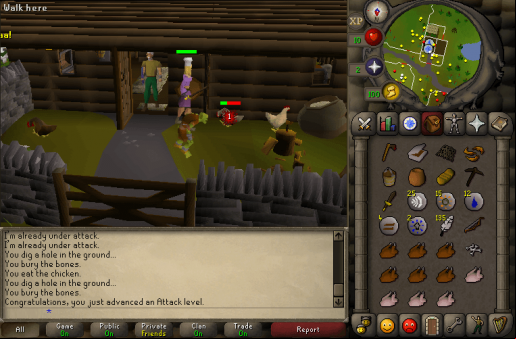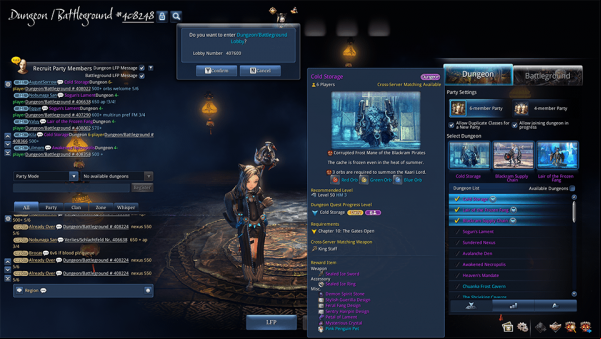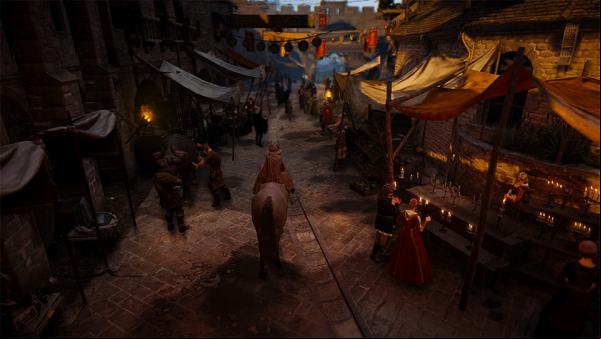Removing “Massively” From MMORPG

These days jumping into a new MMORPG isn’t as magical as it used to be. We’re no longer enthralled by the wonder and fantasy of a new universe because our urge to explore is spoiled by the availability of fully uncovered maps on the internet that show every rock and bush in the game world. A lot of content in today’s MMORPGs can be experienced by queueing for groups in the comfort of a city or hub. It removes any incentive to explore the world and makes me wonder why developers bother to create worlds in the first place if they’re rarely used. Why not put that time and effort into creating content that players experience regularly like dungeons?
Sitting in town and forming groups sums up my current Blade and Soul experience. I don’t even use the cross-server group finder tool to enter a dungeon because Zaiwei, the main hub at level 50, has portals to every major instance. Couple that with an abundance of useful NPCs a short distance from the portals and you’ll find little reason to ever step outside and explore the world.
Blade and Soul feels similar to games like Vindictus once you reach max level. You a hub where players congregate and form a group, open up a map or list of locations to decide where you want to go, then when everyone’s ready you teleport to an area with monsters to defeat, loot to collect, and perhaps a boss to slay. Warframe and Vindictus are both extremely fun and successful games so it’s not a bad thing that Blade and Soul feels similar. The lack of a persistent open world is usually the reason why they aren’t dubbed “massively” multiplayer games, but if the world is devoid of content and only used as a leveling area then it feels almost pointless to have it in the first place.
“Massively” can also refer to the amount of people you potentially encounter in game. Blade and Soul s up to 7000 players per server so you’re going to run into a human sooner or later, but how many of them would you actually interact with? I tallied up the number of people I spoke to during a week of playing Blade and Soul and it came to a staggeringly low amount: 11. So what made up this number?
- 4 guildmates I regularly play with.
- 3 friends I met through online communities that I occasionally do dungeons with.
- 2 players I had a conversation with in a group finder dungeon group.
- 1 stranger that screamed profanity at me after an arena match.
- 1 newcomer in faction chat that needed help.
11 players. That’s all.
Most of the online player base are probably inside dungeons, arena, or idling in different cities, so although I only speak to a handful of players every week it doesn’t make the game any less qualified to be called an MMORPG—but could it be considered any more “massively multiplayer” than other games with matchmaking? In a single day of Overwatch I interact with more players than I do in week of Blade and Soul. If “massively multiplayer” refers exclusively to the amount of people you encounter then it should be called an MMOFPS, but most gamers call it an FPS and omit the MMO—so why don’t people do that with MMORPGs?
Even if you don’t interact with all the players on a server it doesn’t mean they aren’t somewhere in game. Watching players run around in the city and interacting with each other gives you the feeling of a persistent open world filled with other people, but what if you replaced all of those human players with NPCs? Would it make the wo
rld feel any less “massive”?
Black Desert Online accomplishes something special in this regard. The world is inhabited by countless NPCs that breathe life into the beautifully detailed areas across the map, giving the game an immersive quality that’s unlike anything I’ve seen before in an MMORPG. Guards patrol the streets, civilians roam around and converse with each other, and merchants try to peddle their goods to you. It’s akin to single player RPGs such as Skyrim or The Witcher 3—and that’s the problem.
Aside from the end-game guild content, Black Desert Online doesn’t encourage or require you to group with other players and most of the game can be experienced as a solo player. Slaying mobs, fishing, taming horses, arranging your house, gathering resources, hiring workers, exploring the world: none of these require outside help and can be done at your own pace. Even if you wanted to assist friends the limited player to player trading doesn’t allow for it. Plenty of people have been enjoying Black Desert Online as a single player game with multiplayer features and unlike traditional MMORPGs, they can completely ignore the proposed end-game of PvP sieging and guild wars.
MMORPGs grow more ambitious with each new release but despite advances the genre has made, it’s hard to see them as anything more than single player games with added multiplayer features or lobby-based affairs that could do just fine without an open world. Genre definitions are fickle and can be interpreted in many ways (Overwatch is a fighting game because I can FIGHT other people!) and the MMORPG identity is no exception. Should it be a dungeon-centric game like World of Warcraft’s Legion expansion, or should it be a player-driven sandbox like Albion Online?
Whatever your preferences the illusion of a massively multiplayer world doesn’t last as long as it used to. Perhaps it’s time to remove the “massively” from MMORPG and reserve our favourite 6-letter abbreviation for the future generation of online RPGs. To a game worthy of that title.





